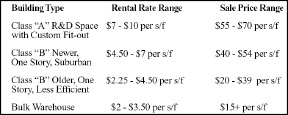As of January 2013, our newly merged Massachusetts and Rhode Island Chapter of the Appraisal Institute has been working hard to put forward timely market observations, interesting educational offerings, and joint networking events. I am pleased to introduce the following summary on the Industrial Market by Providence local expert, Tom Andolfo, MAI, SRA, co-chair of the Rhode Island Branch Chapter of the Massachusetts/Rhode Island Chapter of the Appraisal Institute.
The Rhode Island industrial market encompasses a rather broad spectrum of product ranging from turn-of-the-century mills located in secondary urban settings to modern, single-story facilities located in suburban parks. However, overall, a good amount of the statewide market lies somewhere in between these two extremes.
In general, buyers typically prefer industrial park locations as compared to non-industrial park areas, and high-bay space (18 feet or higher) in the 15,000 - 25,000 s/f category that also offers good on-site parking and having highway access are most desired.
Since around September 2008 through 2011, and as a reflection of the nation's Great Recession, the Rhode Island industrial real estate market has been in a period of destabilization with sale prices and rental rates declining and vacancies increasing. The general contraction of the market which resulted from property foreclosures and a high unemployment rate had generally provided an arena where available supply exceeds effective demand. Speculative construction was not viable and with the absence of federal and state historic tax credits in attracting buyers for the rehabilitation/re-use of the older mill-type property, such rehabilitation projects are proved not to be financially viable.
Rhode Island's overall industrial vacancy rate has held somewhat fixed around 10.5% from 2010 through 2012. However, there is optimism that this market will begin to show signs of improvement in 2013, as rental rates and sale prices are fairly reasonable and affordable.
Observation of tenant rental rates, as well as sale prices, generally reflect that overall rates and prices typically decline as the size of the building space increases. Further, general observations relating to older, mill-type, class C industrial structures which have building areas in excess of 50,000 s/f, or those that have inefficient multi-story floor plans, show that the market reflects the lowest segment of the rental range as ranging from $1 - $4 per s/f and with sale prices typically below the $15 per s/f level. As can be expected, mill-type structures have or typically experienced the most significant market resistance relative to both lease and sale due to multi-story construction and physical, functional, and external obsolescence issues inherent within this product type.
Current trends indicate that the current market generally prefers one-story industrial buildings in suburban parks or locales and specifically, those buildings removed from urban settings and more inner-city locations. Those facilities that feature good quality, modern and efficient floor plans in well-located suburban settings having ample parking and good highway access are expected to continue to have greater demand over the multi-story urban industrial product types.
In summary, the above chart provides the appraiser's observations of the rental rate range and sale price range anticipated for the class A, B, and C industrial product types.
The author, Tom Andolfo, MAI, SRA, is the owner of Andolfo Appraisal Associates, Inc. in Providence.
On May 1st, the Massachusetts & Rhode Island Chapter will host the ASA for a joint meeting and networking event. We look forward to seeing you there!
Also, check out the latest update on AI's Residential Green and Energy Efficient Addendum: What Appraisers Need to Know on You Tube . . .a timely update for professionals and consumers.
Karen Hanlon, MAI, MRICS is the 2013 president of the Massachusetts and Rhode Island Chapter of the Appraisal Institute, Boston.
Tags:









